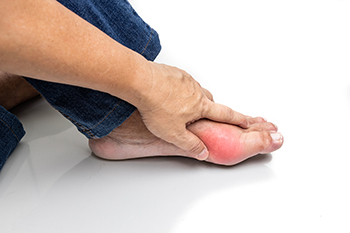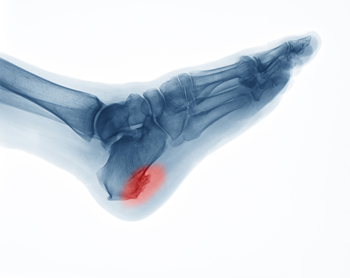
Gout is a form of arthritis caused by the buildup of uric acid crystals in the joints, leading to sudden and intense pain. This condition commonly affects the big toe but can also involve other joints such as the ankles, knees, and wrists. Uric acid accumulates when the body produces too much of it or fails to eliminate it efficiently. Consuming foods high in purines, such as red meat and seafood, excessive alcohol intake, obesity, and certain medical conditions can contribute to the development of gout. Symptoms include severe joint pain, redness, swelling, and warmth in the affected area. Episodes often occur unexpectedly and may last for several days. If you have developed this painful condition, it is suggested that you are under the care of a podiatrist who can help you to manage gout.
Gout is a foot condition that requires certain treatment and care. If you are seeking treatment, contact one of our podiatrists from Summit Podiatry. Our doctors will treat your foot and ankle needs.
What Is Gout?
Gout is a type of arthritis caused by a buildup of uric acid in the bloodstream. It often develops in the foot, especially the big toe area, although it can manifest in other parts of the body as well. Gout can make walking and standing very painful and is especially common in diabetics and the obese.
People typically get gout because of a poor diet. Genetic predisposition is also a factor. The children of parents who have had gout frequently have a chance of developing it themselves.
Gout can easily be identified by redness and inflammation of the big toe and the surrounding areas of the foot. Other symptoms include extreme fatigue, joint pain, and running high fevers. Sometimes corticosteroid drugs can be prescribed to treat gout, but the best way to combat this disease is to get more exercise and eat a better diet.
If you have any questions please feel free to contact one of our offices located in Wilmington, Whiteville, and Wallace, NC . We offer the newest diagnostic and treatment technologies for all your foot and ankle needs.

Skiing places significant stress on the feet, with several bones playing a critical role in maintaining balance and control. The ankle is vital for flexibility and movement, allowing skiers to adjust their stance. The heel bone, or calcaneus, absorbs the impact from skiing and helps with stability. The navicular bone, located on the inner side of the foot, supports the arch and contributes to shock absorption. The forefoot, consisting of the metatarsals, bears much of the skier's weight, especially during turns and jumps. The toes provide balance and grip inside the ski boot, enabling precise control over the skis. Proper alignment and strength in these bones are important for preventing injuries and ensuring optimal performance on the slopes. If you have injured your foot while skiing, it is suggested that you consult a podiatrist who can treat various foot conditions, and guide you on how to protect your feet and ankles while enjoying your desired sport.
If you have any concerns about your feet, contact one of our podiatrists from Summit Podiatry. Our doctors can provide the care you need to keep you pain-free and on your feet.
Biomechanics in Podiatry
Podiatric biomechanics is a particular sector of specialty podiatry with licensed practitioners who are trained to diagnose and treat conditions affecting the foot, ankle and lower leg. Biomechanics deals with the forces that act against the body, causing an interference with the biological structures. It focuses on the movement of the ankle, the foot and the forces that interact with them.
A History of Biomechanics
- Biomechanics dates back to the BC era in Egypt where evidence of professional foot care has been recorded.
- In 1974, biomechanics gained a higher profile from the studies of Merton Root, who claimed that by changing or controlling the forces between the ankle and the foot, corrections or conditions could be implemented to gain strength and coordination in the area.
Modern technological improvements are based on past theories and therapeutic processes that provide a better understanding of podiatric concepts for biomechanics. Computers can provide accurate information about the forces and patterns of the feet and lower legs.
Understanding biomechanics of the feet can help improve and eliminate pain, stopping further stress to the foot.
If you have any questions please feel free to contact one of our offices located in Wilmington, Whiteville, and Wallace, NC . We offer the newest diagnostic and treatment technologies for all your foot and ankle needs.

Heel spurs are bony growths that develop on the underside of the heel bone due to prolonged stress, inflammation, or repetitive strain. They often form in response to plantar fasciitis, as the body deposits calcium in an attempt to repair chronic microtears in the fascia. While many heel spurs cause no symptoms, others lead to pain, especially during walking or standing. Calcaneal spurs, which form on the calcaneus, or heel bone, are one of the most common types. Risk factors include high-impact activities, obesity, flat feet, and wearing unsupportive footwear. Treatment focuses on reducing inflammation with stretching, orthotics, and supportive shoes. If you have a heel spur and it is causing pain, it is suggested that you see a podiatrist for an evaluation and appropriate treatment solutions.
Heel spurs can be incredibly painful and sometimes may make you unable to participate in physical activities. To get medical care for your heel spurs, contact one of our podiatrists from Summit Podiatry. Our doctors will do everything possible to treat your condition.
Heels Spurs
Heel spurs are formed by calcium deposits on the back of the foot where the heel is. This can also be caused by small fragments of bone breaking off one section of the foot, attaching onto the back of the foot. Heel spurs can also be bone growth on the back of the foot and may grow in the direction of the arch of the foot.
Older individuals usually suffer from heel spurs and pain sometimes intensifies with age. One of the main condition's spurs are related to is plantar fasciitis.
Pain
The pain associated with spurs is often because of weight placed on the feet. When someone is walking, their entire weight is concentrated on the feet. Bone spurs then have the tendency to affect other bones and tissues around the foot. As the pain continues, the feet will become tender and sensitive over time.
Treatments
There are many ways to treat heel spurs. If one is suffering from heel spurs in conjunction with pain, there are several methods for healing. Medication, surgery, and herbal care are some options.
If you have any questions feel free to contact one of our offices located in Wilmington, Whiteville, and Wallace, NC . We offer the latest in diagnostic and treatment technology to meet your needs.

